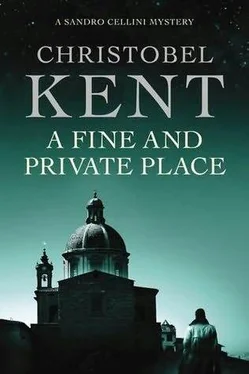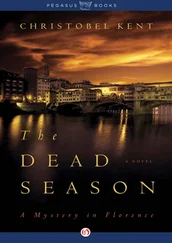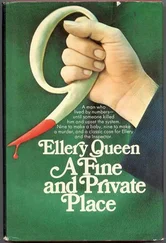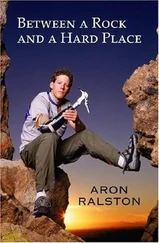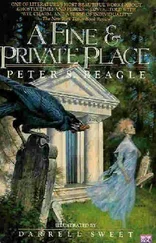Christobel Kent - A fine and private place
Здесь есть возможность читать онлайн «Christobel Kent - A fine and private place» весь текст электронной книги совершенно бесплатно (целиком полную версию без сокращений). В некоторых случаях можно слушать аудио, скачать через торрент в формате fb2 и присутствует краткое содержание. Год выпуска: 2011, ISBN: 2011, Издательство: Macmillan, Жанр: Криминальный детектив, на английском языке. Описание произведения, (предисловие) а так же отзывы посетителей доступны на портале библиотеки ЛибКат.
- Название:A fine and private place
- Автор:
- Издательство:Macmillan
- Жанр:
- Год:2011
- ISBN:9781429970808
- Рейтинг книги:4 / 5. Голосов: 1
-
Избранное:Добавить в избранное
- Отзывы:
-
Ваша оценка:
- 80
- 1
- 2
- 3
- 4
- 5
A fine and private place: краткое содержание, описание и аннотация
Предлагаем к чтению аннотацию, описание, краткое содержание или предисловие (зависит от того, что написал сам автор книги «A fine and private place»). Если вы не нашли необходимую информацию о книге — напишите в комментариях, мы постараемся отыскать её.
A fine and private place — читать онлайн бесплатно полную книгу (весь текст) целиком
Ниже представлен текст книги, разбитый по страницам. Система сохранения места последней прочитанной страницы, позволяет с удобством читать онлайн бесплатно книгу «A fine and private place», без необходимости каждый раз заново искать на чём Вы остановились. Поставьте закладку, и сможете в любой момент перейти на страницу, на которой закончили чтение.
Интервал:
Закладка:
After the operation in November fifteen months earlier, Luisa had taken a month off, December, for the chemo, and though they’d continued the course through January and February, by then she’d had enough of sitting at home twiddling her thumbs. She only took the Friday and Saturday off each week: Friday to have the drugs, Saturday to lie down in a darkened room while he fed her dry biscuits andcamomile tea because just lifting her head off the pillow made her throw up. And Sunday to snap at Sandro all morning, although by the evening she’d have softened and become tearful; he wasn’t sure which was more difficult to handle.
And Monday she’d be back at work, reliable solid Luisa on the shop floor at Frollini, in the shadow of the Palazzo Vecchio, selling 500-euro shoes to pretty, spoilt women from across the world; unfailingly polite, occasionally generous with her discount, irreducibly proud of her wares. Not so solid as she used to be; the chemo had shaved a few kilos off her, and the surgery had taken one of her breasts and left a foamrubber prosthesis in its place. They’d talked about reconstruction at the hospital, but Luisa’s face had turned blank and stubborn at the mention of more surgery, any more time spent in the hospital than was strictly necessary to save her life; the prosthesis would do fine.
There’d been a check-up in late March, an unseasonably hot day out at Careggi, the two of them waiting for an hour and a half in a Portakabin that was serving as a temporary clinic. Sandro had tried to hold his wife’s hand but she’d been impatient with him; it was too hot, she’d said. When they’d finally got into the consulting room there’d been a rash close to the scar line that might have been a cause for concern, but it had turned out to be the heat; nothing to worry about. Another check-up in September had been clear; we’ll leave it nine months till the next one, they’d said.
Next to that piece of news, of course — the outcome so covertly longed for he still hardly dared believe it — work didn’t matter. Shouldn’t matter. But Sandro hated not being able to provide; he didn’t want Luisa having to worry about money.
In the quiet suburban street — quiet but for that ceaseless hum of drones on their way in to the city — the light was grey still. The sun was no more than a lemon-yellow glow behind the eastern hills, but the sky was clear, only a couple of wispy scraps of cloud to the east, tinged with pink. It was very cold.
Sandro took a slug of his cooling, sugary tea, pulled on his gloves, and rubbed his upper arms vigorously. He felt as though he was in a kind of no man’s land, in this anonymous street where it was neitherday nor night. The invisible man. A useful quality in a private detective, perhaps, if not in life.
‘Take her away for a break,’ Pietro had said.
All year, since the chemo finished, he’d been asking her: fancy a trip up to the Cinque Terre, for Easter? Maybe we could go down to Puglia again, for summer?
‘Let’s wait till after the next check-up,’ it had been to start with, then, ‘Not now.’ Frollini had stayed open all August, and she wasn’t going anywhere. Her boss, smooth old Frollini himself, older than Sandro but in better nick, had told Luisa she was the jewel in his crown.
‘We can’t afford it,’ had been Luisa’s weary trump card.
Because you’re not earning, are you? Not really . That was what she had not said.
Before this job had got him out of the house by six, Sandro had lain awake every morning thinking what he’d say to her, if he was brave enough.
I don’t want you seeing more of your boss than you do of me, he’d say. I want my coffee at home, at the kitchen table with you in your big white dressing-gown fussing about at the stove.
I want it to be like it used to be.
But now it was too late, wasn’t it? Sandro always seemed to be one step behind; while he was still working out how to talk to his own wife, things had taken a new turn at Frollini. Luisa was going places, and he was going to be left behind.
And suddenly there was action. Up ahead the girl banged out of her front door, shouting something over her shoulder into the dark house. In a tight plaid bomber jacket, tighter jeans, sheepskin boots and fingerless gloves, she hauled a bright pink Vespa out from under the verandah’s overhang, dropped the satchel into a top-box, reached down for a helmet, wheeled the vehicle at a run out into the road and was off.
Sandro’s day had begun.
Chapter Two
It only came into view at the last minute, shielded from her by the mass of willows that grew up beside the river; Caterina Giottone only saw it in time to do a little swerve and wobble on the motorino , and she was safely past. The high, white flank of a truck, lifting equipment on its flatbed, the flicker of red and white tape; intent on getting to work, she didn’t look back, so that was all she saw. Then she hit the patch of ice and it was just as well she hadn’t been craning her neck to look behind her or she’d have been on the tarmac with a broken bone or two.
The scooter steadied when she changed down a gear. Hunched over the handlebars, Caterina — Cate to her friends — crept up the hill. It was cold; oh, Jesus God, it was cold.
It was so cold that even through her layers of fleece and wool and leather, Cate could no longer feel her toes. The defined ridges of her cheekbones, exposed to the breathtaking, knife-sharp chill, felt as though they had been flayed. As her motorino sputtered to the crest of the hill, Orfeo finally came into view and Cate reflected, as she did on her way to her place of work most mornings, that it was nothing like home.
It was partly the geography. Cate had grown up in the wide, flat Val di Chiana, where you could see for miles and everywhere you lookedthere was habitation: the great grazing plains of the Chianina cattle punctuated by square, turreted farmsteads, hay-barns and, increasingly, by capannoni , the low grey hangars of light industry. The closest hills to Cate’s home village were soft and round and topped with towns and bell-towers, their slopes clustered with restaurants and bars and crowds of teenagers.
This place was a different matter, the Etruscan Maremma; two hours to the south, yet the hills were rocky, barren, inhospitable and wild, surmounted by the occasional bleached and silent village. To a town girl like Cate it seemed so empty, dusty and brown and bare and wild in the depths of winter, the leafless trees and desiccated brambles clinging like cobwebs to their slopes. Cate had been renting a room in the closest town to the castle, a flyblown place on the edge of the plains called Pozzo Basso, and on her eight-kilometre motorino ride in to work, she passed only the occasional farmhouse as she wound through the silent hills.
Some of them had become ruins, overrun with wild vines, reabsorbed by the landscape. They gave Cate a chill, the half-discernible mounds beneath ivy, the scattered stones, like half-buried bodies. They made her think, how quickly a human being would disappear.
They called the castle quite simply Orfeo, though what remained of the Orfeo family themselves were holed up in Florence in their luxurious villa, the castle being too uncomfortable, too draughty, too expensive to heat. Most of the staff, unlike Cate, were locals, their families associated with the place for generations, and the Trust meant nothing to them; the prodigal son who had crossed the Atlantic in the thirties, made his money in steel during the war and then returned, in awe of the American way, to set up an English-speaking artists’ retreat. They tolerated the Trust, run from offices in Baltimore, but fifty years didn’t count for much in this landscape, pitted with Etruscan caves, where even the Romans were relative newcomers.
Читать дальшеИнтервал:
Закладка:
Похожие книги на «A fine and private place»
Представляем Вашему вниманию похожие книги на «A fine and private place» списком для выбора. Мы отобрали схожую по названию и смыслу литературу в надежде предоставить читателям больше вариантов отыскать новые, интересные, ещё непрочитанные произведения.
Обсуждение, отзывы о книге «A fine and private place» и просто собственные мнения читателей. Оставьте ваши комментарии, напишите, что Вы думаете о произведении, его смысле или главных героях. Укажите что конкретно понравилось, а что нет, и почему Вы так считаете.
